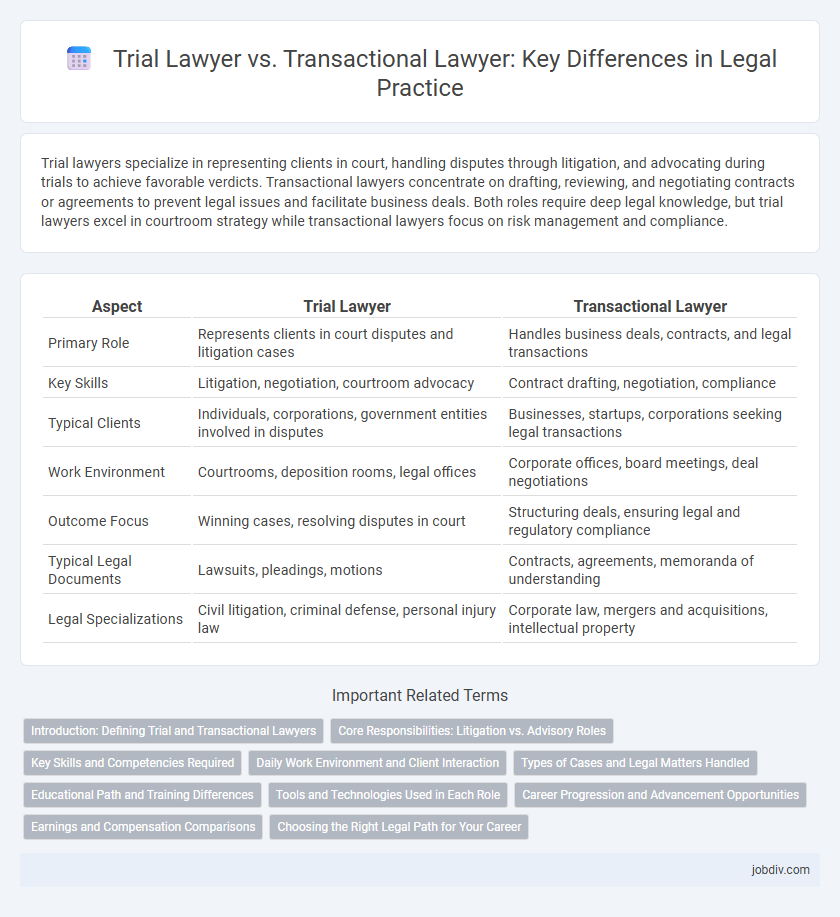Trial lawyers specialize in representing clients in court, handling disputes through litigation, and advocating during trials to achieve favorable verdicts. Transactional lawyers concentrate on drafting, reviewing, and negotiating contracts or agreements to prevent legal issues and facilitate business deals. Both roles require deep legal knowledge, but trial lawyers excel in courtroom strategy while transactional lawyers focus on risk management and compliance.
Table of Comparison
| Aspect | Trial Lawyer | Transactional Lawyer |
|---|---|---|
| Primary Role | Represents clients in court disputes and litigation cases | Handles business deals, contracts, and legal transactions |
| Key Skills | Litigation, negotiation, courtroom advocacy | Contract drafting, negotiation, compliance |
| Typical Clients | Individuals, corporations, government entities involved in disputes | Businesses, startups, corporations seeking legal transactions |
| Work Environment | Courtrooms, deposition rooms, legal offices | Corporate offices, board meetings, deal negotiations |
| Outcome Focus | Winning cases, resolving disputes in court | Structuring deals, ensuring legal and regulatory compliance |
| Typical Legal Documents | Lawsuits, pleadings, motions | Contracts, agreements, memoranda of understanding |
| Legal Specializations | Civil litigation, criminal defense, personal injury law | Corporate law, mergers and acquisitions, intellectual property |
Introduction: Defining Trial and Transactional Lawyers
Trial lawyers specialize in courtroom litigation, representing clients in civil or criminal cases by presenting evidence and arguing before judges and juries. Transactional lawyers focus on drafting, negotiating, and reviewing contracts, facilitating business deals, mergers, and compliance with regulatory frameworks. Both roles require deep legal expertise but serve distinct functions within the legal system.
Core Responsibilities: Litigation vs. Advisory Roles
Trial lawyers specialize in representing clients in court by managing pleadings, presenting evidence, and advocating during trials to secure favorable verdicts. Transactional lawyers focus on drafting, reviewing, and negotiating contracts, ensuring legal compliance, and providing strategic advice to facilitate business deals and prevent future disputes. The core responsibility of trial lawyers centers on dispute resolution through litigation, while transactional lawyers prioritize advisory roles to support proactive legal decision-making.
Key Skills and Competencies Required
Trial lawyers excel in litigation, requiring skills in oral advocacy, evidence examination, and negotiation under pressure, alongside strong analytical reasoning and persuasive communication. Transactional lawyers need expertise in drafting contracts, regulatory compliance, risk assessment, and deal structuring, emphasizing meticulous attention to detail and proactive problem-solving. Both roles demand comprehensive legal knowledge, ethical judgment, and the ability to adapt strategies to complex client needs and evolving legal environments.
Daily Work Environment and Client Interaction
Trial lawyers regularly navigate high-pressure courtrooms, preparing and presenting evidence to persuade judges or juries, while their client interactions often involve frequent consultations to strategize case developments. Transactional lawyers operate primarily in office settings, drafting and negotiating contracts or agreements to prevent legal disputes, maintaining ongoing communication with clients to ensure alignment on complex business transactions. Both roles require tailored communication skills, but trial lawyers emphasize advocacy and litigation readiness, whereas transactional lawyers focus on risk management and deal facilitation.
Types of Cases and Legal Matters Handled
Trial lawyers specialize in litigating disputes in court, handling cases such as criminal defense, personal injury, and contract disputes that require courtroom representation and advocacy before a judge or jury. Transactional lawyers focus on non-litigious legal work, managing matters like drafting contracts, negotiating mergers and acquisitions, real estate transactions, and compliance with regulatory requirements. The distinction lies in trial lawyers resolving conflicts through litigation, while transactional lawyers facilitate business deals and legal agreements outside court.
Educational Path and Training Differences
Trial lawyers typically complete rigorous training in courtroom procedures, evidence rules, and litigation strategy, often participating in moot court and trial advocacy programs during law school. Transactional lawyers concentrate their education on contract law, corporate finance, and regulatory compliance, frequently gaining experience through internships with law firms or corporate legal departments specializing in mergers and acquisitions or real estate. Both paths require passing the bar exam, but trial lawyers often seek additional certification in trial advocacy, while transactional lawyers pursue specialized courses in negotiation and contract drafting.
Tools and Technologies Used in Each Role
Trial lawyers utilize evidence management software, digital trial presentation tools, and legal research databases to prepare and present cases effectively in court. Transactional lawyers rely heavily on contract management systems, document automation software, and secure communication platforms to draft, review, and negotiate agreements efficiently. Both roles increasingly use artificial intelligence for due diligence and risk analysis, enhancing accuracy and productivity in legal workflows.
Career Progression and Advancement Opportunities
Trial lawyers typically experience career progression through increased court responsibilities, reputation-building via high-profile cases, and potential partnership roles in litigation-focused firms. Transactional lawyers advance by deepening expertise in contract negotiation, corporate compliance, and deal structuring, often moving into senior advisory positions or in-house counsel roles within corporations. Both paths offer upward mobility but differ in skill development, with trial lawyers honing advocacy and courtroom strategy, while transactional lawyers emphasize negotiation and regulatory knowledge.
Earnings and Compensation Comparisons
Trial lawyers typically earn higher compensation due to contingency fees and performance bonuses tied to case outcomes, often ranging from $70,000 to over $200,000 annually depending on experience and success rate. Transactional lawyers usually receive more stable salaries, averaging between $85,000 and $150,000, with compensation reflecting firm size, location, and client portfolio rather than case victories. Bonuses for transactional lawyers are generally based on billable hours and client retention, contrasting with the high-risk, high-reward pay structure common in trial law practice.
Choosing the Right Legal Path for Your Career
Trial lawyers specialize in courtroom litigation, advocating for clients in civil or criminal cases through trials and hearings, requiring strong public speaking and quick thinking skills. Transactional lawyers focus on drafting and negotiating contracts, mergers, and compliance matters, demanding meticulous attention to detail and expertise in business law. Choosing the right legal path depends on your strengths, whether you excel in persuasive argumentation or strategic negotiation in corporate settings.
Trial Lawyer vs Transactional Lawyer Infographic

 jobdiv.com
jobdiv.com